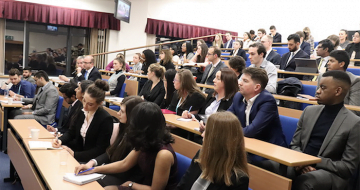Ahead of Legal Cheek’s Secrets to Success event in Leeds, criminal barrister turned ULaw dean Tom Macdonald gives his top tips

Tom Macdonald is the dean of The University of Law in Leeds. Ahead of Legal Cheek’s fourth Secrets to Success event — at which he will be speaking alongside lawyers from Pinsent Masons, Irwin Mitchell, Womble Bond Dickinson and Exchange Chambers — the former criminal barrister reveals his top tips to bar success.
Get involved with societies
There wasn’t a bar society at the University of Southampton, where Macdonald studied. So he reached out to Lincoln’s Inn who awarded him £100 to set up Lincoln’s Inn Bar Society — which still runs today as the Inns of Court Society. “I wanted to create a platform where Southampton students could network with members of staff previously at the bar and participate in competitions”, says Macdonald. By doing this: “You pick up a range of soft skills, such as leadership, managing a budget, and communication”, he says.
Interviewing for an Inn’s scholarship was “suspiciously easy”; this was because Macdonald’s early involvement with the Inn “left absolutely no question mark over [his] commitment to becoming a barrister”. “Someone will notice when you’re doing something constructive,” he says.
Seize opportunities to network
As part of his involvement with the bar society, Macdonald regularly attended events held at Lincoln’s Inn. When hearing a criminal barrister shed light on her “incredibly colourful and exciting” practice, he reached out after the talk and managed to secure a mini-pupillage at her chambers. “Speak to these people — they’re doing what you want to be doing and are best placed to help you get there,” he encourages.
During mini-pupillage, Macdonald recommends taking every opportunity to network. He says:
“You don’t want to be remembered as the desk-bound pupil that never came out of their room. Instead, you want to be the pupil who knocked on members’ doors asking for available work.”
The networking doesn’t stop at pupillage; it’s important to continue doing so when working with solicitors. “It’s a magical moment when a solicitor chooses to send you a trial with your name on it. They’ve specifically instructed you and may lead to an even meatier trial on the back of it,” he says.
Strike positive relationships with your classmates
It’s important to remember that your classmates are your future colleagues and so don’t approach the Bar Professional Training Course (BPTC) with a hyper-competitive attitude. “You should all be able to learn from as well as teach each other. The best students never see themselves as finished products — they are always open to constructive criticism and eager to improve,” he says.
Be the full package
It’s not only about having stellar academics at the bar, Macdonald tells Aishah Hussain: “Participate in debate, mooting and negotiation competitions, and work pro bono at a law clinic. You could even try karaoke to get accustomed to the performance aspect of the role.”
Marshalling is a great opportunity to gain practical insight into the daily workings of the court. His students often share “incredible” stories of how judges have afforded their time to go through court procedure with them. It’s also a good idea to sit in the public gallery at your local court and watch barristers on their feet.
Be savvy when making your pupillage application
Securing pupillage is no mean feat since you’re competing against your year as well as students from previous years, too — Macdonald completed over 50 applications across two years before eventually securing his.
Having at least two to three mini-pupillages in a particular area on your form is enough to demonstrate a level of commitment. Should you accrue more, it then becomes a question of narrowing your focus since “not all of it needs to be on your application”.
It’s worth noting: “You don’t have to have purely legal work experience in order to demonstrate you have the skills required.” For example, if you’ve had experience working in retail, you’ve probably undergone training, had to deal with customers and held some level of financial responsibility. “Never undervalue the skills you can add to your profile. Always advocate on behalf of yourself,” he says.
Ace the interview
When asked how candidates can stand out at interview, Macdonald remarks: “They have to have a certain pizzazz — it’s easy to differentiate between someone who speaks from passion and a robot reading from a script.” Another important element is preparation: “Make sure you’re on top of current affairs and can form a view on them if asked — especially those which relate to a chambers area of practice,” he advises.
Never let the small things go amiss either, Macdonald warns, such as being on time and your attitude towards support staff. In the instance where there are two exceptionally good candidates and the panel must only select one: “The objective thing to alight upon could be personal presentation”, Macdonald explains. “I knew a student who thought he could get away with wearing a character tie to his interview. Though it looked like a plain black tie when tucked into his blazer, it was in fact a musical tie, and he accidentally set it off during interview! This is a professional interview; dress accordingly,” he says.
You’ve got to be yourself at interview, says Macdonald, who made the panel laugh with an off-the-cuff comment he made during the case study section of his interview. He was offered the pupillage on his way home because they felt he came across as genuine and that a jury would have certainly remembered him. Though, there is a line not to be crossed: “One student I know researched each panellist beforehand, so much so that he overstepped the mark in thinking he knew one panellist on a friendly level and cracked a joke that was not very well-received!”
Keep going
If things don’t work out “the first person you should look to for feedback is yourself”, he advises. Spend time reflecting on an interview (including those cringe-worthy moments!) and think how you can improve for the next. Macdonald always encourages his students to “politely request feedback”. If this isn’t available, the next step is to visit your tutor or a careers advisor and share an honest account of the interview so that they can guide you. Macdonald also recommends that students ask those who’ve successfully been through the process for the feedback they received post-interview. “Feedback is generally quite hard to come by so look at different ways you can source and learn from it”.
It’s always worth having a back-up plan, cautions Macdonald. “Don’t be blinkered and think your only path is to qualify as a barrister and work in a set of chambers once you’re on the BPTC,” he says. The skills you acquire are the “trunk of a many-branched tree” and can lead to many exciting job prospects.
Understand the reality
There’s a lot more to the criminal bar than the fancy gowns and wigs portrayed on television. Macdonald thinks it’s imperative students understand the reality of the career they’re about to take on. Though there have been cuts to the criminal legal aid budget, this shouldn’t deter students with a genuine interest in this field. “It’s not a case that the criminal bar is dying — there is still a decent living to be made if you do your research and find out which sets are particularly healthy,” he says.
When starting the BPTC, it’s not a good idea to “hit the ground running” because if you do so then “you will fall”, insists Macdonald. Instead, he advises “a brisk trot” where students “keep up” rather than “catch up” with their workload, because once you’re behind: “It’s hard to do so — particularly when using someone else’s notes!”
The BPTC isn’t easy, as some students might think. You have to grapple with the practical elements of the course such as advocacy, as well as principles and ethics. With a minimum 36-hour week and 12 hours of contact, Macdonald says it’s as rigorous as a full-time job. Holding down a job alongside the BPTC can prove challenging, but “I worked part-time in a bar while studying for the bar — it’s feasible if you can manage your time efficiently”.
Don’t restrict yourself to London
Macdonald traded the London criminal bar for academia in Leeds, and insists students think broadly. “It’s simply not true that London is the sole location to have a great career,” he says. The impression he’s had from colleagues practising in Leeds is that the work is likely to be contentious sooner than might be the case in London because the numbers competing with you are far fewer. The quality of work undertaken is still very much national and international in scope and it’s not unheard of for second-six pupils to take on trials on their own.
Keep in mind your emotional skillset and soft skills
“A great barrister is one who has a strong character and can deal with the unexpected,” says Macdonald.
“You could be handed a trial overnight and have to process a huge amount of material before standing up in court the next day to defend real people with real-life problems. When counsel throw something up from the other side, you have to think fast on your feet and decide whether to deal with it then or adjourn, the latter of which may have cost implications.”
In some practice areas, such as criminal law “you develop a real thick skin”, says Macdonald, who has worked on several cases involving robbery, sexual assault and child abuse. “You need to be able to compartmentalise your own personal view of the case and do what’s best for your client. You’ll learn how to shake the previous case off and move on to the next — having a little gallows humour also helps,” he quips.
Tom Macdonald will be speaking at our fourth Secrets to Success event in Leeds tomorrow. Apply for one of the final places to attend.


